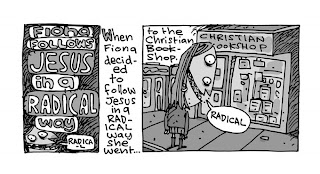How Bad Omen’s new full-length album forced me to face up to the question of theodicy
Listening to the record reminded of this certain feeling of discomfort that I felt when I watched the NOFX concert in Manila two years ago, where after a few ignorant racial remarks NOFX then preceded to poke fun at Christians. This was not the first time that I felt this way whenever I would listen to a punk rock album or attend a gig.
As a Christian I would admit that it is in these satirized depiction of organized religion that I would always feel the sting of their sentiments, because they are poking fun at the people whom I (
for better or for worse), I would consider as a brethren. I feel the sting mostly because whether I like it or not the punks’ take on my beliefs are for the most part true.
However it is also in these truthfulness of the punks’ parody of my personal faith that I find the ‘beauty of doubt’ in the way I live my life as a person of faith in the world. And Bad Omen’s new album, God Is Everywhere is one of those few records that challenges me to face the seriousness of Christianity’s failure to live up to the Gospel mandate as well as to ask those difficult questions about those that lie at the core of my belief.
In theology there exists the problem of theodicy which is defined by theologians as an attempt to harmonize the reality of evil with an omniscient, omnipotent, and omni-benevolent God. I come face to face with the question of a Loving God in an evil world where injustice prevails, when I hear the song entitled as: Jesus Hates Me.
As such lyrics like:
“Look up on the sky on bended knees. Pray for forgiveness or ask for anything. Do you think God will listen to you? When everyday there are others who ask too? (God Is Everywhere),”
challenges me all the more to live a life of witness that attempts to vindicate the divine attributes of God, particularly with respect to holiness and justice.
The themes explored by the songs whose lyrics reads something like:
“When you’re in deep $h#@, God is testing you and if you don’t follow God’s rule you’ll end up in hell. (Oh God)”
Misconception comes into mind whenever I would listen to such lyrics primarily because I know full well that those of us in the faith, often fail to live up to the Gospel call of bearing witness to a Crucified and Risen Christ. It is in our portrayal of God as the sanctifier of our desires that often makes people hate organized religion and altogether the God that we worship.
I believe it is in these thought provoking questions about life and death that are expressed in the songs on God Is Everywhere that we also find a number of key affirmations of the Christian faith that ought to challenge us to confront such confusions about God and the faith we profess head-on. One of them is the reality that God shares the world’s suffering, no one will deny or at the very least remove the Easter story from the Christian narrative because it is in Jesus Christ that the Word of God suffers and dies. Human suffering touches God. God is not a distant or so enmeshed in nature that God cannot respond to suffering. Second, God can bring about good from evil. Last is the fact that, God will triumph over evil. At the heart of the central events of the Biblical story, the crucifixion and the resurrection, is the redemptive love of God. Death will be overcome and new life will become reality. God’s promise will be fulfilled. A new heaven and a new earth await those who know Jesus Christ. God frees us from the fetters that bind the present to the new future. Christ’s solidarity with the victims of evil is their liberation.
We all sit with Jesus in Gethsemane in His struggle with God-forsakenness. His prayers seem unanswered: “My soul is sorrowful, even unto death,” He says. The threat of death and destruction is real and anticipated. Jesus wrestles with the question of theodicy like us, just as the poor and faithful struggle with the violence and pain of our world. Here, prayer is the exact opposite of the “opium of the people.”
As I conclude this review I would like to remind all Christians that faith in the God of the Bible is based upon the trust that divine reality is guiding all things toward fulfilment. God’s promises to the people are also promises to fulfil creation. God has an overall purpose for creation that will be realized as the Kingdom of God.
Understanding the faith that people put in the God of the Bible requires that we see the world as the concern of God, not just our concern. After all, it was out of God’s concern for His lost children that He sought to redeem them at the expense of His own Son.














